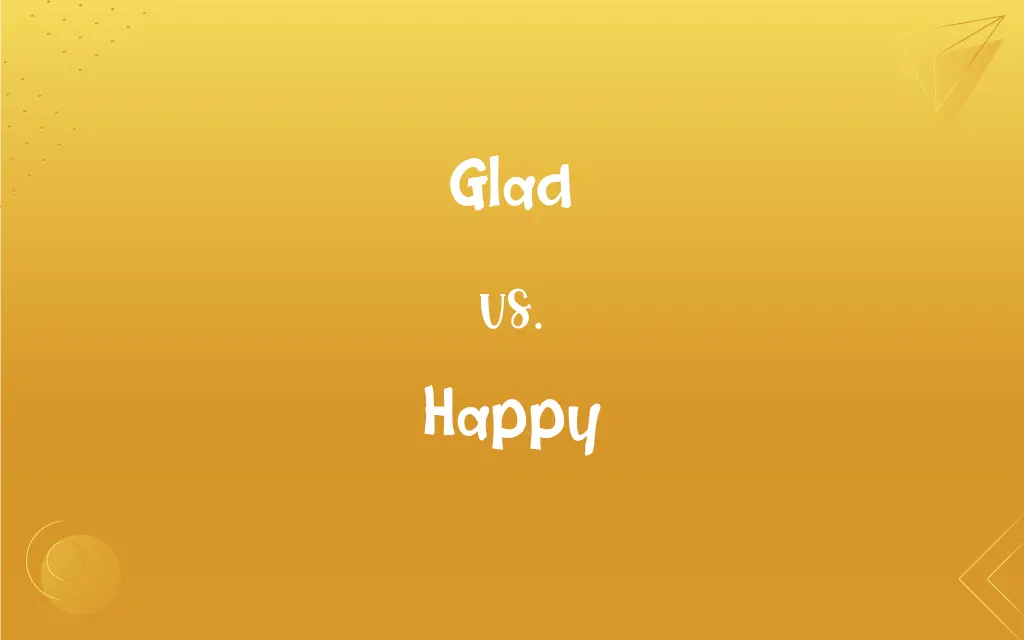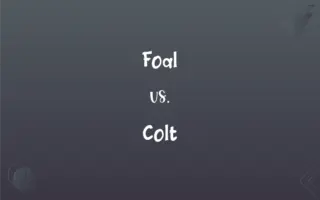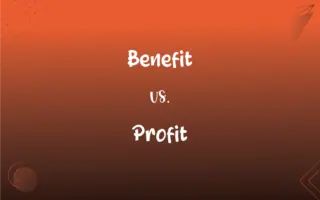Glad vs. Happy: What's the Difference?
Edited by Aimie Carlson || By Janet White || Updated on October 7, 2023
"Glad" implies a feeling of satisfaction or relief, often in response to a specific event, while "Happy" is a broader emotion of joy or contentment.

Key Differences
The word "Glad" conveys a feeling of pleasure or relief, often in response to a specific circumstance or event. For example, one might be glad about receiving good news or when a certain undesirable event is averted. This emotion is often transient, arising from particular situations. When someone says they are glad, it often indicates a weight has been lifted from their mind or they've experienced a pleasant turn of events.
On the other hand, "Happy" is a more encompassing term referring to a state of well-being, joy, or contentment. While happiness can arise from specific situations, similar to gladness, it can also describe a general state of being or a prolonged emotion. One can be happy in life, happy with their job, or happy about certain achievements. It's a term that captures a broader spectrum of positive emotion than "glad."
One of the nuanced differences is that while both "Glad" and "Happy" denote positive emotions, "glad" often carries a hint of relief. For instance, if a feared event doesn't occur, one would more likely say they're "glad" it didn't happen rather than "happy" it didn't. "Glad" often comes into play when there's an absence of a negative, while "happy" is the presence of a positive.
In everyday conversation, people might use "Glad" and "Happy" interchangeably. However, the underlying contexts and emotions they refer to can differ. Both words, though, undeniably contribute to the positive spectrum of human emotions, each in its unique way.
Comparison Chart
Rooted in
Specific events or circumstances
General state or specific events
ADVERTISEMENT
Suggests
Pleasure, relief
Joy, contentment
Duration
Often transient
Can be prolonged or momentary
Associated with
Absence of a negative
Presence of a positive
Use in context
"Glad the rain stopped"
"Happy with life"
Glad and Happy Definitions
Glad
Delighted or joyful about a particular thing.
He was glad about the promotion at work.
ADVERTISEMENT
Happy
Fortunate or lucky.
He had a happy escape from the accident.
Glad
Expressing gratitude or appreciation.
I'm glad you came to the party.
Happy
Satisfied with the quality or standard of something.
I'm happy with the results of the test.
Glad
Pleased about a specific event or situation.
She was glad to hear from her old friend.
Happy
Feeling or showing pleasure or contentment.
She looks happy today.
Glad
Indicating willingness or preference.
I'd be glad to help.
Happy
Apt or felicitous.
It was a happy choice of words.
Glad
Experiencing or exhibiting joy and pleasure.
Happy
Inclined to use a specified thing.
She's always happy to share her knowledge.
Glad
Appreciative
Was glad to be home.
Happy
Enjoying, showing, or marked by pleasure, satisfaction, or joy
A happy child.
The happiest day of my life.
Glad
Providing joy and pleasure
A glad occasion.
Happy
Cheerful; willing
Happy to help.
Glad
Very willing; pleased
Glad to help.
Happy
Characterized by good luck
A happy sequence of events.
Glad
To gladden.
Happy
Being especially well-adapted; felicitous
A happy turn of phrase.
Glad
A gladiolus.
Happy
Characterized by a spontaneous or obsessive inclination to use something. Often used in combination
Trigger-happy.
Glad
Pleased, happy, gratified.
I'm glad the rain has finally stopped.
Happy
Enthusiastic about or involved with to a disproportionate degree. Often used in combination
Money-happy.
Clothes-happy.
Glad
(obsolete) Having a bright or cheerful appearance; expressing or exciting joy; producing gladness.
Happy
Having a feeling arising from a consciousness of well-being or of enjoyment; enjoying good of any kind, such as comfort, peace, or tranquillity; blissful, contented, joyous.
Music makes me feel happy.
Glad
To make glad.
Happy
Experiencing the effect of favourable fortune; favored by fortune or luck; fortunate, lucky, propitious.
Glad
Pleased; joyous; happy; cheerful; gratified; - opposed to sorry, sorrowful, or unhappy; - said of persons, and often followed by of, at, that, or by the infinitive, and sometimes by with, introducing the cause or reason.
A wise son maketh a glad father.
He that is glad at calamities shall not be unpunished.
The Trojan, glad with sight of hostile blood.
He, glad of her attention gained.
As we are now glad to behold your eyes.
Glad am I that your highness is so armed.
Happy
Content, willing, satisfied (with or to do something); having no objection (to something).
Are you happy to pay me back by the end of the week?
Yes, I am happy with the decision.
Glad
Wearing a gay or bright appearance; expressing or exciting joy; producing gladness; exhilarating.
Her conversationMore glad to me than to a miser money is.
Glad evening and glad morn crowned the fourth day.
Happy
(Of acts, speech, etc.) Appropriate, apt, felicitous.
A happy coincidence
Glad
To make glad; to cheer; to gladden; to exhilarate.
That which gladded all the warrior train.
Each drinks the juice that glads the heart of man.
Happy
(in combination) Favoring or inclined to use.
Slaphappy, trigger-happy
Glad
To be glad; to rejoice.
Happy
Dexterous, ready, skilful.
Glad
Showing or causing joy and pleasure; especially made happy;
Glad you are here
Glad that they succeeded
Gave a glad shout
A glad smile
Heard the glad news
A glad occasion
Happy
Implying 'May you have a happy ~' or similar; used in phrases to wish someone happiness or good fortune at the time of a festival, celebration, or other event or activity.
Happy birthday!, Happy Fourth of July!, Happy anniversary!, Happy job-hunting!
Glad
(`lief' is archaic) very willing;
Was lief to go
Glad to help
Happy
A happy event, thing, person, etc.
Glad
Feeling happy appreciation;
Glad of the fire's warmth
Happy
Often followed by up: to become happy; to brighten up, to cheer up.
Glad
Cheerful and bright;
A beaming smile
A glad May morning
Happy
Often followed by up: to make happy; to brighten, to cheer, to enliven.
Glad
Feeling relief after avoiding an undesirable outcome.
I'm so glad I didn't miss the bus.
Happy
Favored by hap, luck, or fortune; lucky; fortunate; successful; prosperous; satisfying desire; as, a happy expedient; a happy effort; a happy venture; a happy omen.
Chymists have been more happy in finding experiments than the causes of them.
Happy
Experiencing the effect of favorable fortune; having the feeling arising from the consciousness of well-being or of enjoyment; enjoying good of any kind, as peace, tranquillity, comfort; contented; joyous; as, happy hours, happy thoughts.
Happy is that people, whose God is the Lord.
The learned is happy Nature to explore,The fool is happy that he knows no more.
Happy
Dexterous; ready; apt; felicitous.
One gentleman is happy at a reply, another excels in a in a rejoinder.
Happy
Enjoying or showing or marked by joy or pleasure or good fortune;
A happy smile
Spent many happy days on the beach
A happy marriage
Happy
Experiencing pleasure or joy;
Happy you are here
Pleased with the good news
Happy
Marked by good fortune;
A felicitous life
A happy outcome
Happy
Satisfied; enjoying well-being and contentment;
Felt content with her lot
Quite happy to let things go on as they are
Happy
Exaggerated feeling of well-being or elation
Happy
Well expressed and to the point;
A happy turn of phrase
A few well-chosen words
A felicitous comment
FAQs
Is "Happy" only about joy?
No, it can also express satisfaction, luck, or contentment.
Does "Happy" always indicate a strong emotion?
Not necessarily; one can feel mildly happy or extremely happy.
Can "Happy" describe a state of being?
Yes, such as being happy in life or with oneself.
Are "Glad" and "Happy" synonyms?
They're similar in meaning, but "glad" often suggests relief while "happy" denotes broader joy.
Can "Glad" suggest an absence of negativity?
Yes, like being glad when something feared doesn't happen.
Can "Glad" indicate a temporary feeling?
Yes, "glad" often arises from specific events, making it transient.
Can "Happy" also be about luck?
Yes, as in a "happy coincidence."
Can I use "Glad" to express gratitude?
Yes, like in "I'm glad you did that for me."
Are both words used commonly in daily language?
Yes, both "glad" and "happy" are frequently used to express positive feelings.
Can "Glad" suggest willingness?
Yes, like "I'd be glad to assist."
Can you be "Glad" about avoiding something?
Absolutely, like being glad about dodging a bullet.
Can "Happy" mean satisfied?
Yes, like being happy with a service or product.
Can "Glad" be used in formal contexts?
Yes, though its use will depend on the specific context.
Is "Glad" ever used to mean happy in general?
While it can, "glad" is often tied to specific events or circumstances.
Can I say "Happy to a fault"?
Yes, it means someone might be too optimistic or cheerful.
Does "Happy" always refer to a strong emotion?
No, its intensity can vary from mild to strong.
Is it correct to say "Happy for your help"?
It's more common to say "happy with your help" or "glad for your help."
Are there any idioms using "Happy"?
Yes, like "happy as a clam."
Which is stronger, "glad" or "happy"?
It depends on context, but "happy" often denotes a broader or more intense emotion.
Can "Glad" express a sense of relief?
Yes, often when a negative situation is avoided.
About Author
Written by
Janet WhiteJanet White has been an esteemed writer and blogger for Difference Wiki. Holding a Master's degree in Science and Medical Journalism from the prestigious Boston University, she has consistently demonstrated her expertise and passion for her field. When she's not immersed in her work, Janet relishes her time exercising, delving into a good book, and cherishing moments with friends and family.
Edited by
Aimie CarlsonAimie Carlson, holding a master's degree in English literature, is a fervent English language enthusiast. She lends her writing talents to Difference Wiki, a prominent website that specializes in comparisons, offering readers insightful analyses that both captivate and inform.































































